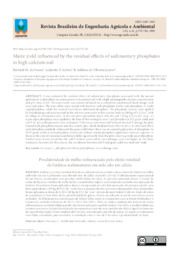Maize yield influenced by the residual effects of sedimentary phosphates in high-calcium soil.
Maize yield influenced by the residual effects of sedimentary phosphates in high-calcium soil.
Author(s): SOUZA, R. M. de; SOBRAL, L. F.; OLIVEIRA JUNIOR, A. de
Summary: It was evaluated the residual effects of sedimentary phosphates associated with the annual application of phosphate on maize grown in Inceptisol soil with a high exchangeable calcium concentration and pH value of 6.0. The experiment was conducted based on a completely randomized block design with strip-split plots. The main plots were treated with Bayóvar rock phosphate, Itafós rock phosphate, or triple superphosphate, while the control received no additional phosphate. The phosphate sources were applied by broadcasting and incorporated in the soil two years prior to the current study at 200 kg of P2O5 ha-1, with no tillage in subsequent years. In the sub-plots, phosphate doses of 0, 60, and 120 kg of P2O5 ha-1 year-1, as triple superphosphate, were applied at the base of the sowing furrows. Leaf phosphorus (P), grain yield, and soil P by ion exchange resin were evaluated. Differences were observed between the leaf P among the plots treated with phosphate sources and the control plot, which declined from 2013 to 2015. In 2013 and 2014, rock phosphate residuals influenced the grain yield when there was no annual application of phosphate. In 2015, grain yields in rock phosphate treatments without annual phosphate application were not superior to those in the control treatment and did not differ significantly from the plots receiving triple superphosphate. Furthermore, it was found that the soil P content extracted by ion exchange resin was higher in the Itafós treatment; however, for this source, the correlation between soil P and grain yield was relatively weak.
Publication year: 2020
Types of publication: Journal article
Keywords: Corn, Fertilizante, Fertilizante Fosfatado, Fertilizers, Fosfato, Milho, Phosphates
Observation
Some of Embrapa's publications are published as ePub files. To read them, use or download one of the following free software options to your computer or mobile device. Android: Google Play Books; IOS: iBooks; Windows and Linux: Calibre.
Access other publications
Access the Agricultural Research Database (BDPA) to consult Embrapa's full library collection and records.
Visit Embrapa Bookstore to purchase books and other publications sold by Embrapa.

